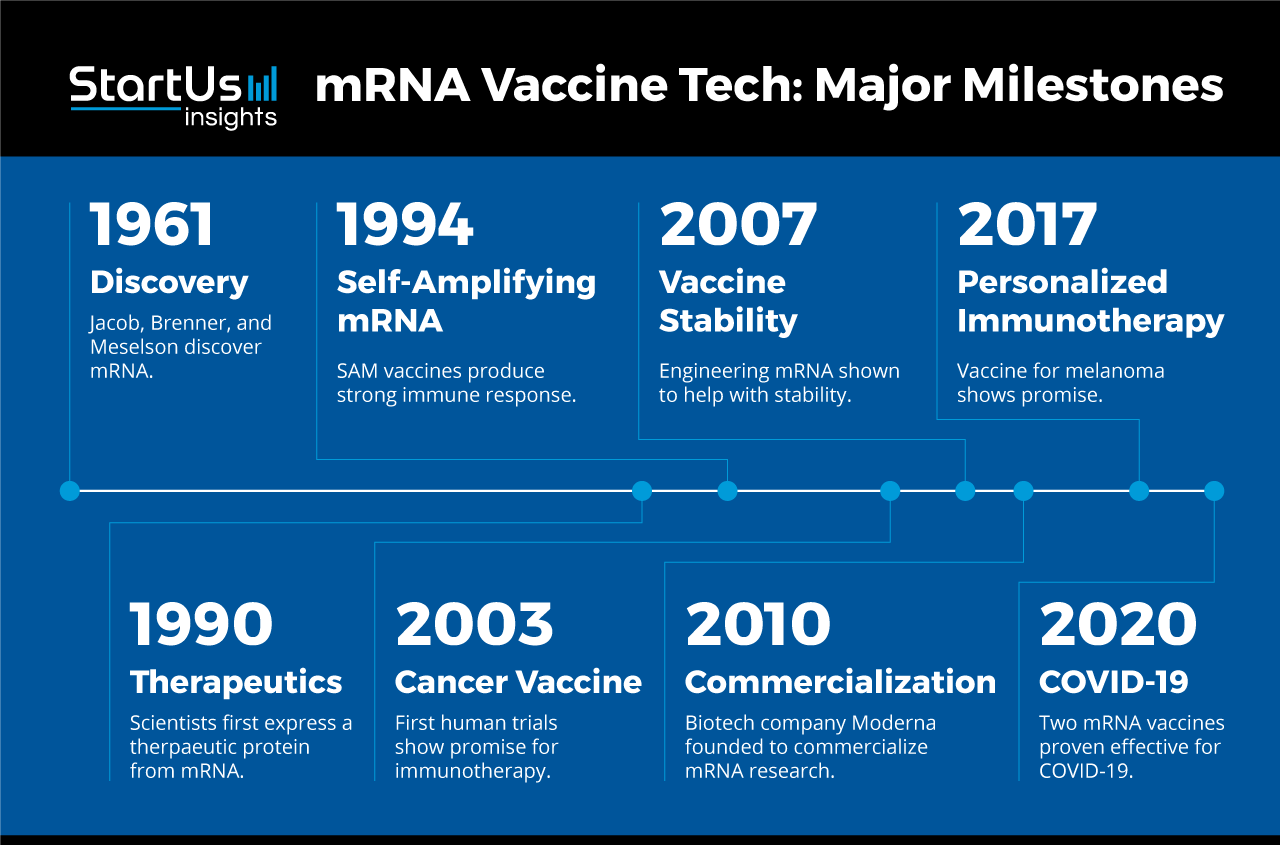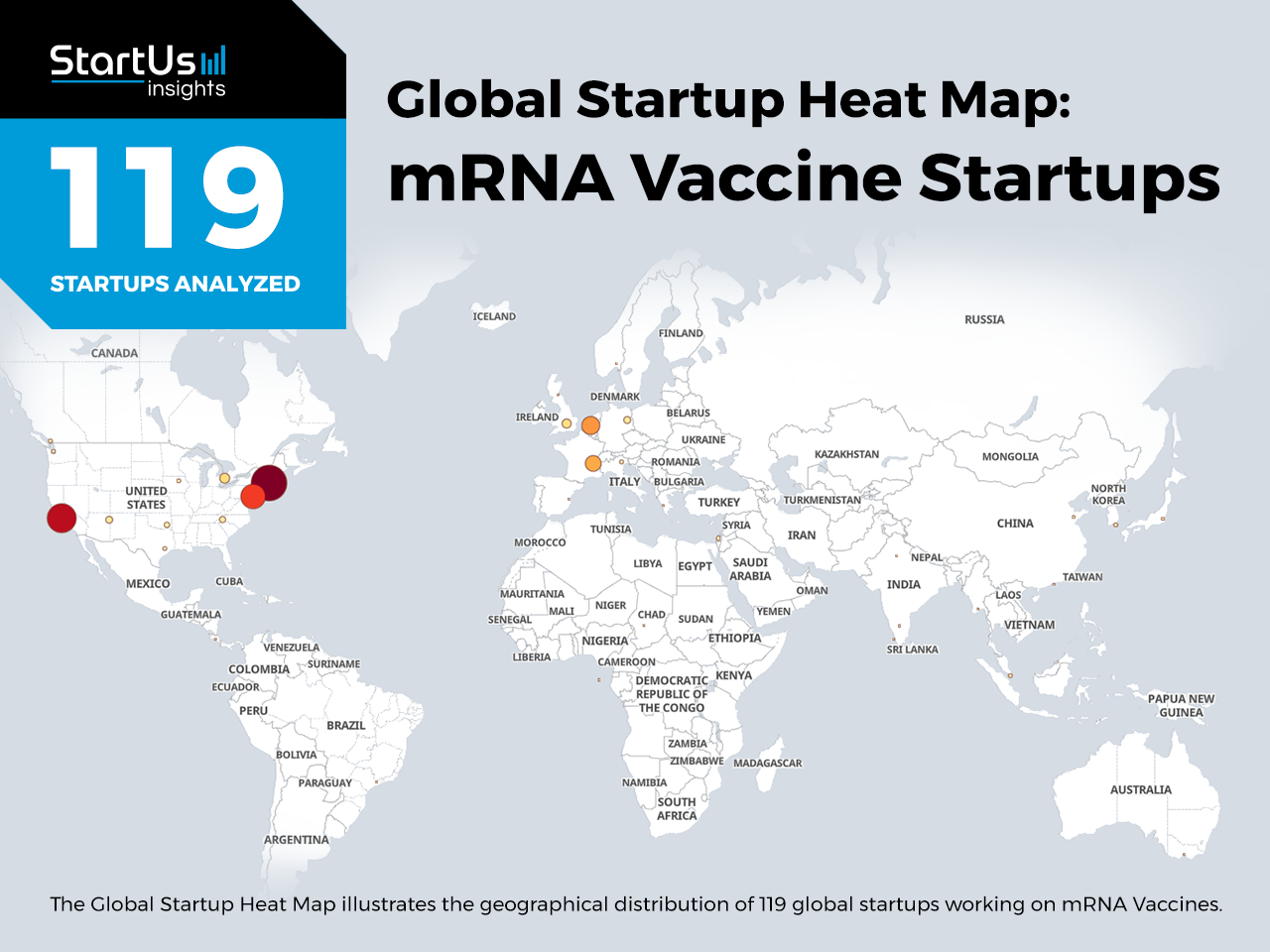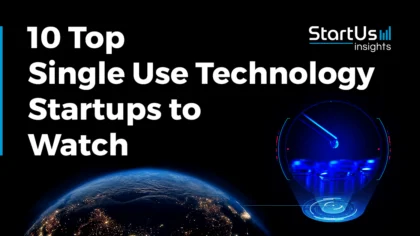Accelerate Productivity in 2025
Reignite Growth Despite the Global Slowdown
In the wake of the coronavirus pandemic, pharma startups globally are in a race to develop a vaccine. Of particular interest are mRNA vaccines, two of which have shown high efficacy in providing immunity against COVID-19. This report leverages the StartUs Insights Discovery Platform to provide you data-driven insights into mRNA vaccine tech startups and their geographical distribution, as well as funding in the field. For instance, though it is a relatively new vaccine technology, startups working on mRNA vaccines raise more money than the average vaccine startup.
Pfizer and Moderna in the race for a COVID-19 vaccine
Pfizer recently announced that their vaccine, developed in collaboration with the German company BioNTech, is 95% effective. This means that the vaccine prevented COVID-19 in 95% of the volunteers, 28 days after the first dose, compared to the placebo. Moderna, a US-based company founded in 2010, also reported a similar efficacy for their COVID-19 vaccine.
A significant difference between the two vaccines could determine how they are distributed. The Pfizer vaccine needs to be shipped and stored at -70 °C, whereas the Moderna vaccine is fairly stable during shipping and refrigeration storage at -20 °C and 2 °C to 8 °C, respectively. This means that the Pfizer vaccine demands a robust cold chain network, which could limit its distribution in remote areas and developing countries.
However, it’s a striking similarity between the two vaccines that could have great implications for the pharma sector. It also explains how Pfizer/BioNTech and Moderna were able to produce highly effective vaccines at such speed. Both vaccines are mRNA-based. If and when either is approved, it will also be the first mRNA vaccine to be approved to protect humans against any disease
What are mRNA vaccines?
Cells translate mRNA, short for messenger RNA, into proteins that do almost everything in the cells – build structures, regulate functions, and build structural components. mRNA vaccines leverage this process to introduce an antigen that elicits an immune response. By design, the synthetic mRNA template codes for enough of the pathogen (the novel coronavirus in this case) for an immune response, but not the parts that cause the disease. Since mRNA can be easily obtained from the pathogen DNA using regular lab consumables, mRNA vaccines are relatively inexpensive to manufacture. They also take much less time to produce as clinically ready samples can be ready within weeks of the pathogen genome being available.
Moreover, the mRNA vaccine is a platform technology. This means once a startup has figured out how to produce and deliver it, it can easily be replicated to target other diseases. Once inside the host cells, the cell machinery will translate any mRNA that the vaccine carries. By simply changing the synthetic messenger RNA to match the antigens on another virus, the vaccine would also work as a treatment of that virus. This flexibility is how Moderna could pivot its platform, originally developing a vaccine for influenza, to work on a vaccine for COVID-19.
Traditional vaccines use live or inactivated pathogens to elicit an immune response. With these vaccines, there is always a risk of the pathogens reverting to virulent forms and causing severe symptoms. With mRNA vaccines, the mRNA gets degraded quickly after the proteins are made. Even before it degrades, the mRNA doesn’t interact with the host genome, minimizing any risk of integration. This makes them extremely safe to use. However, immunogenicity is a concern with mRNA vaccines. As the proteins are produced in vivo, the inherent variability could reduce the immunogenicity as compared to proteins purified in a lab. Startups overcome this by modifying the RNA to increase immunogenicity.
To summarize, mRNA vaccines are safe, effective, and, most importantly, easy to produce. They are also our best bets for a widely available COVID-19 vaccine. So, what else are mRNA vaccine tech startups working on?
Global Startup Heat Map: mRNA Vaccine Tech Startups
As a company with a mission to map the world’s information on innovations, emerging companies, and technologies, we routinely look into emerging solutions that impact lives globally. To discover innovations in vaccine tech, we used the StartUs Insights Discovery Platform to identify startups and scaleups that develop messenger RNA vaccine technologies. Discover some of the startups we hand-picked for this research below.
We also looked at the global geographic distribution of 119 mRNA vaccine tech startups & scaleups. The Global Startup Heat Map below gives you a clear picture of where the major hubs are, as well as up-and-coming regions that show significant activity. Pharma startups working on mRNA vaccines are primarily concentrated in Boston and California, which are home to 3 out of 5 top hubs in pharma.
Funding for mRNA Vaccine Tech on the Rise
Reflecting the grown interest in mRNA vaccine platforms, most of the funding has happened only in the last four years, with startups averaging funding of $70M. The amount is higher than the average funding of $27M for vaccine startups in general in the same time span. A major impetus behind this trend has been the promising clinical trials for use of mRNA vaccines in the treatment of cancers and infectious diseases, such as Zika. Outside of the US, pharma hubs in the Netherlands, the UK, and other European countries are driving innovations in the technology.
mRNA Vaccine Tech Helps Pharma Startups Move Fast
Although the first mRNA vaccine tests had been carried out in the early 1990s, prior to November 2020, this type of vaccine was considered only a candidate for future use in humans. Сompanies have put their best efforts into the development of mRNA-based technologies that find applications in disease prophylactics and therapy. Startups and scaleups develop mRNA-based vaccines to fight infectious and chronic diseases, various types of cancer, as well as for protein replacement therapeutics.
eTheRNA immunotherapies – Infectious Diseases & Cancer Vaccines
Belgian scaleup eTheRNA immunotherapies specializes in vaccine development against infectious diseases and cancer. Currently, the scaleup takes an active part in the development of mRNA vaccine against COVID-19 for primary risk populations.
Providence Therapeutics – Personalized mRNA Vaccines
Canadian startup Providence Therapeutics primarily focuses on the development of personalized cancer therapeutic vaccines using mRNA technologies. The startup is also involved in the development of two mRNA-based COVID-19 vaccines, one in the design phase and the other undergoing preclinical studies.
pHion Therapeutics – Therapeutic Vaccines & Delivery
UK-based startup pHion Therapeutics focuses on the development of therapeutic mRNA vaccines. Aiming to create treatment options for those suffering from cancer or papillomavirus, the startup works on a number of vaccines that are now in preclinical development. Additionally, the startup plans to revolutionize drug delivery with its RALA system capable of generating a potent therapeutic response.
The inefficiency of delivery caused by the instability of mRNA was one of the major reasons behind the lack of attention to the mRNA technology. The development of effective drug delivery systems plays a significant part in improving the efficiency of mRNA therapeutics and its resulting disruptive potential.
20Med Therapeutics – mRNA Nanoparticle Delivery
For instance, Dutch startup 20Med Therapeutics applies nanoparticle technology to develop a delivery platform for RNA therapeutics. The technology utilizes bioresponsive characteristics of polymeric nanoparticles to protect payloads during administration and circulation.
Vaccine Platforms are Future-Proof
The ongoing coronavirus pandemic is not the last. As climate change and deforestation push more people in proximity to wild populations, humanity will see more infectious diseases in the years to come. However, we can learn our lessons. While the world at large should come together to reverse climate change, the pharma industry has to be prepared for the next pandemic. The mRNA vaccine tech shows how.
The industry needs to invest in flexible vaccine platforms that allow startups and companies to develop a vaccine within months of a new infectious disease. This includes a wide range of other vaccine platforms, such as the engineered virus behind the Oxford/AstraZeneca COVID-19 vaccine. Moreover, the industry has to go a long way to set up robust distribution networks that cover everyone on the planet. Lastly, sustained investments in pharma manufacturing will ensure that we have enough doses fast enough when the next pandemic occurs.
Is your business ready for the future?
The fact that there are three effective vaccines in a span of 11 months is a testament to advances in pharma, but more importantly to how rapid innovations can be if the right collaborations happen. Platform technologies help pharma companies design clinical trials, digitize operations, and develop novel tools such as organs-on-a-chip.
Regardless of your industry and the solutions you are looking for, we provide you data-driven insights into new startups, scaleups, and emerging technologies to help you stay immune and resilient in the face of future challenges.



![10 Top Blockchain Solutions for Pharma Industry [2025]](https://www.startus-insights.com/wp-content/uploads/2025/06/Pharma-Blockchain-Startups-SharedImg-StartUs-Insights-noresize-420x236.webp)




